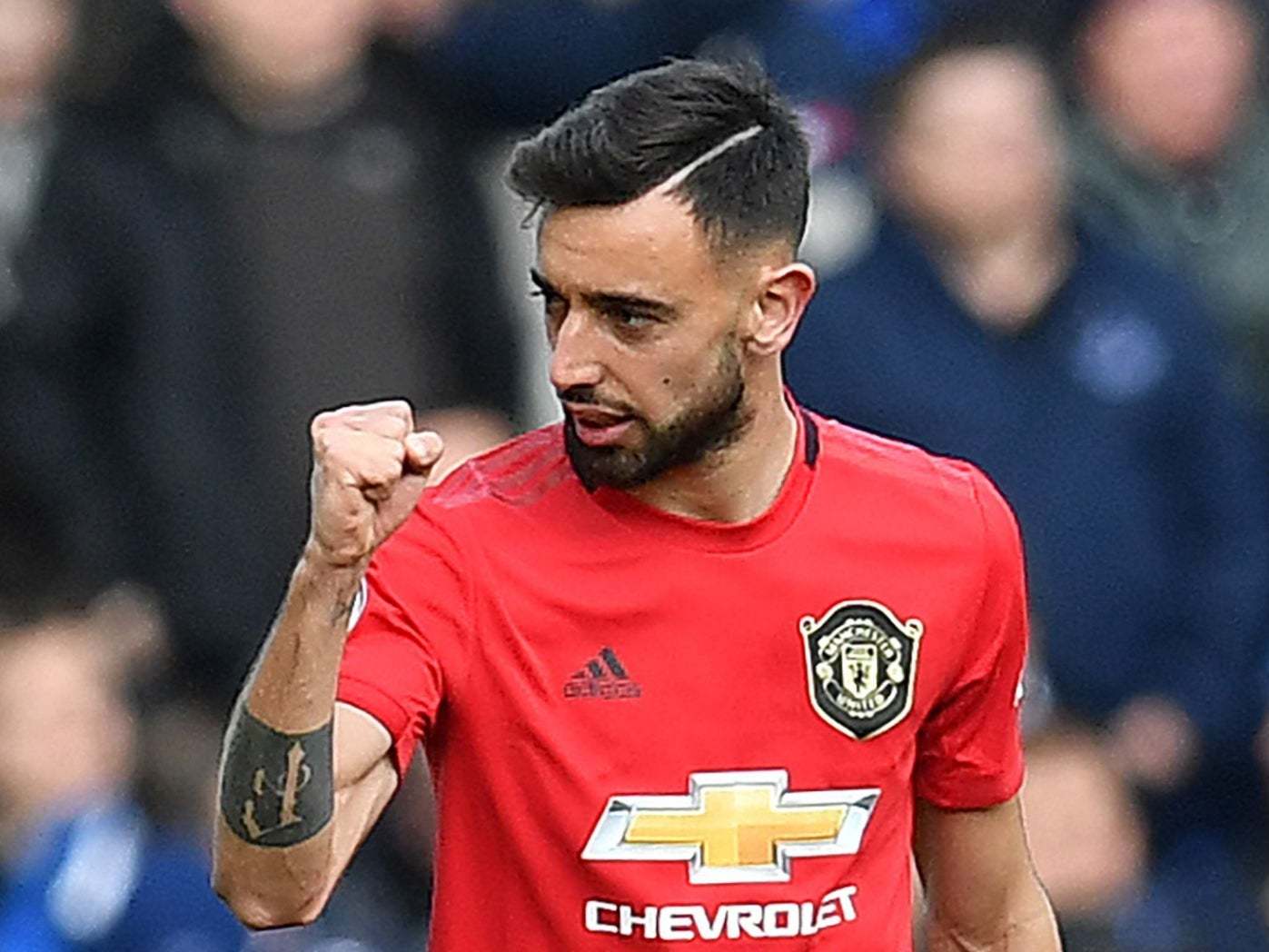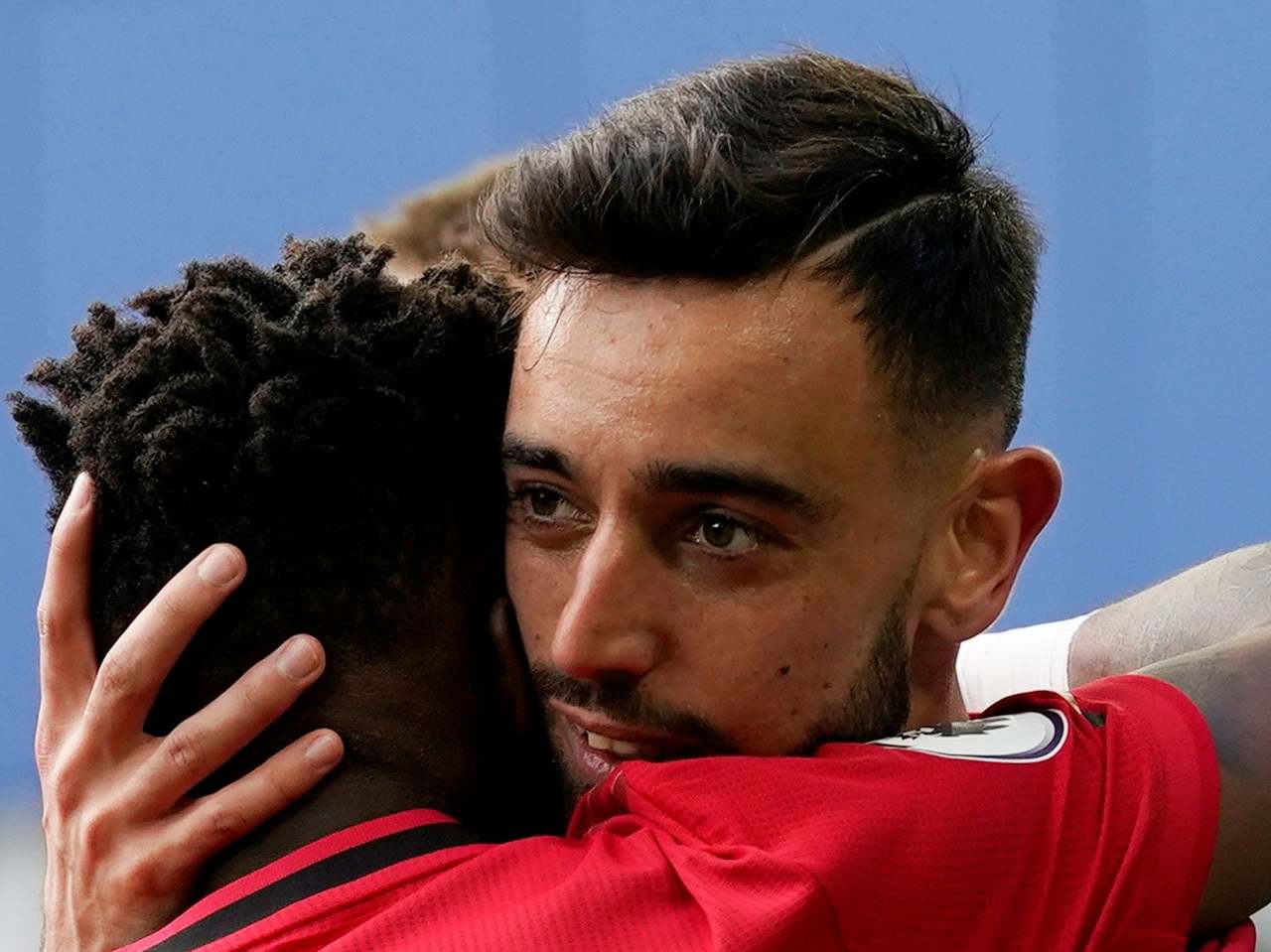How talismanic Bruno Fernandes has transformed Manchester United on and off the pitch
Portuguese midfielder has immediately turned Ole Gunnar Solskjaer’s side into a dangerous prospect
After the touch, and the vision, one of the first things the Manchester United players noticed about Bruno Fernandes was the voice.
He has immediately been very vocal in training. There was no initial trepidation, as often happens when foreign players arrive in the United dressing room.
A natural response to that, of course, is that this isn’t a normal United dressing room. It is younger and much less success-laden than pretty much any time in the last few decades.
But this is something else that Fernandes has started to change – the very atmosphere in the dressing room. Training is also said to have gone up a level.
“Certainly Bruno has fitted in great on the pitch, and is as important around the pitch and in the dressing room,” assistant manager Michael Carrick says. “He has got a real presence about him and the lads have taken to him well. Importantly he has settled in well, but more importantly, he has lifted the standard and the spirit within the squad.”
Such assertiveness, of course, has been most visible on the pitch. The easiest way to put it is that Fernandes has just made United a much more dangerous prospect.
The stats say even more. Since his debut, Fernandes has provided more assists (two), created more chances (seven) and had more shots (10) than any other United player in the Premier League. As much as anything, Fernandes just imposes an attacking plan on the team, in the absence of one before.
It is a little like a lower-key version of what Luka Modric and Toni Kroos did for Real Madrid six years ago. Their game intelligence together instantly lifted the whole team, setting a pattern of what to do in possession. It similarly helps that Fernandes has developed an “instant connection” with players like Juan Mata.

United just have more cohesion and creativity. It helps explain why their form – and particularly that against the more defensive-minded bottom-half clubs – has taken a sudden upward turn.
If it is fairly elementary that “signing very good attacker makes team better”, and something that should have been obvious to United long before this, there is naturally a bit more to it. It is also why this Sunday’s Manchester derby, and these next 10 days, may yet represent a bit of a referendum on this regime.
Sources say it still isn’t inconceivable that the club change manager this summer, especially with Mauricio Pochettino available, although executive vice-chairman Ed Woodward is “desperate” for Ole Gunnar Solskjaer to succeed.
As to what success would be, Champions League qualification and a domestic cup – to go with an ongoing internal restructuring – would certainly fit the requirements. And this is why these league games against Manchester City and Tottenham Hotspur are so crucial, and Fernandes’ signing so timely.
While Solskjaer obviously has qualities as a manager, it’s fair to say that his organisation of an attack is some way short of ‘best practice’ like that of Pep Guardiola or Jurgen Klopp. There just aren’t the same structure or patterns. The pressing is nowhere near as frenetic or co-ordinated. It is all a bit more open-ended, and looser. Some at United maintain this is intentional, in order to allow a certain freedom, and would point to the impact of a player like Fernandes.
One counter is that Guardiola has perfectly shown how to integrate individualism into collective co-ordination, and this is now a prerequisite for getting the best out of the best players. Another counter is the example of his predecessor, and his next opponent in the league: Jose Mourinho. Solskjaer’s approach to attack isn’t as laissez-faire as the Portuguese’s, but is certainly closer to that than the rigour of Klopp or Guardiola.
The impact United have got out of Fernandes is at least comparable – in principle – to that which Mourinho got out of Eden Hazard and other creative players. The idea is generally to just let them play their game, and produce.

Mourinho, for his part, had an academic rationale for it. The idea is called “guided discovery”, which is when players are encouraged to figure out solutions for themselves.
This is fine when players are on form and firing, as happened with the first few months of Chelsea’s 2014-15 team or Fernandes now. The problems come when there is disruption, or form drops, or players drop out through injury or suspension. It’s when you see greater breakdowns, as happened with that Chelsea in the last few months of Mourinho’s reign, and as arguably happened to United without Paul Pogba before Fernandes arrived. The players suddenly find that, without the kind of flow that comes from form, there is nothing to fall back on. They start to look aimless and without structure. Again, a classic example was Tottenham Hotspur on Wednesday night against Norwich City. That is what may still test United.
Fernandes has had an immense impact. There is a new assertiveness to the side, as could be seen with the penalties he’s taken. No discussion. Just putting it down, and putting it in. The question is how sustainable his impact alone is. This weekend will start to give voice to that.
Join our commenting forum
Join thought-provoking conversations, follow other Independent readers and see their replies
Comments
Bookmark popover
Removed from bookmarks